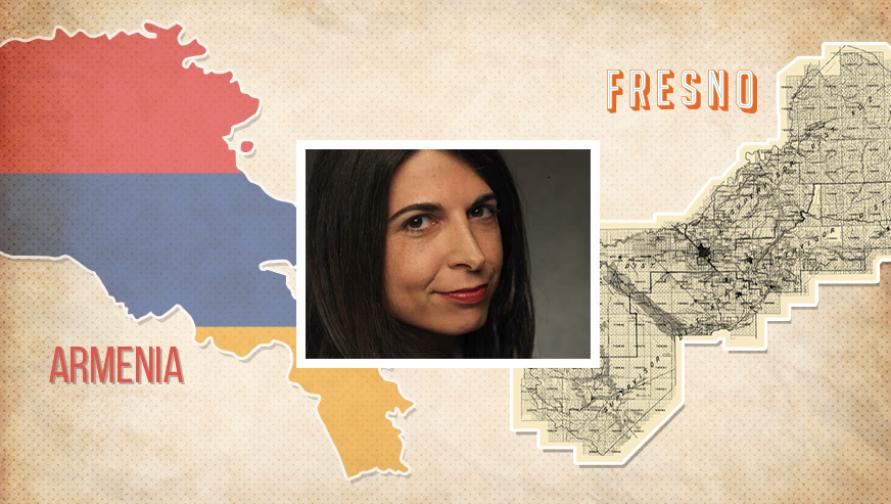
By Lilibeth Garcia
Born and raised in Fresno, California, UCI alumna Linda Shekerjian (B.A. drama ’93, English ’95) grew up in one of the oldest Armenian communities in the United States. Despite this, she never learned to speak her ancestral language of Western Armenian. When Shekerjian would ask her paternal grandmother, a native speaker, to teach her, she would respond, “Who are you going to talk to?” Her grandmother was a survivor of the Armenian Genocide, in which over a million subjects of the Ottoman Empire were systematically annihilated between 1915 and 1923. She and her siblings had fled Armenia and come to the U.S. through Ellis Island.
“My grandmother saw first-hand that the Turks were trying to kill the Armenians, and she was an immigrant who had the mindset to assimilate – at least for her children and grandchildren – to succeed in America,” Shekerjian says. “She didn’t think it was practical to teach me the language.”
UNESCO declared Western Armenian an endangered language in 2010, mostly because it’s rarely taught intergenerationally. Fewer and fewer descendants of genocide survivors who live outside of Armenia learn Western Armenian.
UCI is home to one of the nation’s only programs teaching the endangered language. With the help of many community members, Director of the Center for Armenian Studies Houri Berberian launched the Western Armenian language series in 2018. It nearly immediately reached maximum enrollment with students vying for a spot. In remembrance of her grandmother’s words, Shekerjian recently made a significant estate gift to the program, helping to ensure its long-term sustainability.
Shekerjian’s family history in California stretches all the way back to the 1880s. Her maternal great-grandfather had traveled to the West Coast in search of a new home, and an accidental stop in Fresno secured his family’s fate. Shekerjian’s great-great-grandparents had been farmers in what is now Turkey, and the Central Valley offered a similar terrain and climate. Pretty soon, the Bedrosians were the first extended Armenian family to settle in Fresno.
The family had seen that a future in Armenia was unsustainable. They had observed the friction between the Armenians and the Ottoman Empire leading up to the Hamidian massacres that took place between 1894 and 1896, in which up to 300,000 Armenians were killed. The genocide occurred two decades later. Shekerjian’s great aunt once told her she used to write back-and-forth with family overseas, but at some point, the letters stopped coming back. The worst was reasonably assumed.
Assimilation in the U.S. meant survival. Fresno had a history of institutional anti-Armenian discrimination, which barred the ethnic group from buying property, working at schools, participating in politics and more. In California, Shekerjian’s maternal grandparents changed their last name from Bedrosian to Peters. Her paternal family kept their last name, and Shekerjian remembers how it impacted her self-esteem. Even though she grew up in a city with a prominent Armenian community, children made fun of her name and racialized her physical features.
“I wanted to have an Anglo-sounding name because I didn't want to stand out,” Shekerjian says.
Once at UCI, Shekerjian found a culture of acceptance. When she told a T.A. that she wanted to change her last name, the T.A. said, “Why? I think Shekerjian is beautiful.” She never forgot those words. In 1989, Shekerjian and other women of the diaspora – including Silva Karageozian, who now heads the UCI Armenian American Alumni Chapter – started an Armenian Club on campus. What started with only a handful of members grew to hundreds of people four years later. “It wasn’t until I got to UCI that I met people who embraced my ethnic heritage,” Shekerjian says.
These days, Shekerjian no longer shies away from her roots – quite the opposite. She shares her passion for Armenian American history while greeting guests at the William Saroyan House Museum, which displays artwork and multimedia relating to the acclaimed Armenian writer from Fresno. During the pandemic, Shekerjian became engaged with the UCI Center for Armenian Studies through their virtual events. She stayed connected to her history and culture through the center’s film screening of Mimi Malayan’s “The Stateless Diplomat: Diana Apcar’s Historic Life”; a conversation with David Gutman about his book The Politics of Armenian Migration to North America, 1885-1915; panel discussions on Armenian communities in the Middle East today; and an event on the war in Artsakh.
“This is why it's important for me to support the Western Armenian language program, because I can honor my ancestors by giving in this way,” she says. “I would have loved the opportunity to learn Western Armenian at UCI when I was an undergraduate, so my hope is that, if there is someone else like me – who is Armenian and interested in learning about their ancestor’s language – then here's the opportunity.”
There are many ways to create a legacy at UCI Humanities. To learn more about estate gifts, please contact Sean Fischer at seandf@uci.edu or 949-824-0438.
Publicly launched on Oct. 4, 2019, the Brilliant Future campaign aims to raise awareness and support for UCI. By engaging 75,000 alumni and garnering $2 billion in philanthropic investment, UCI seeks to reach new heights of excellence in student success, health and wellness, research and more. The School of Humanities plays a vital role in the success of the campaign. Learn more here.
